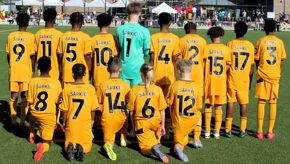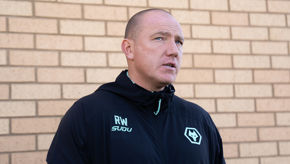In the first of a series of articles featuring the backroom staff from the Under-21 squad, Matt Adams catches up with the man behind the machine! Or more specifically the analysis work designed to help the club's up-and-coming players make the most of their talent.
*
Since Mike Bateman returned to Wolves as the head of Academy Performance Analysis in October 2011, it’s fair to say that his role and surroundings have changed quite a bit.
Any such changes have been necessary to keep up with the demands of modern day football, and the benefits are there for all to see.
Bateman, pictured with striker Bradley Reid, said: “Software has changed and developed in that time and in terms of the way we work in the Academy, the club philosophy coming into place has helped as it’s allowed us to work within a settled structure.
“Our playing philosophy is broken down into four phases and that dictates the way we analyse a game.
“We know what we’re looking for in terms of how a team is set up, and we interject that with the individual analysis.
“Each player will have their own key development points over the course of a season and we help to develop that.
“When we started there was Phil Boardman in the first team and Chris West – who’s just recently moved on - in the Academy.
“We were in a room which was like a shoebox cupboard, with no natural light, one desk between us and a TV on the wall!
“From that we’ve now grown into a fully-fledged department - two members of staff with the First Team, three full time members in the Academy plus a Masters Student and volunteer support.
“It has grown massively, and we’ve been lucky and fortunate enough that the club have supported us in our growth.”
Bateman has also worked at Manchester City, West Ham United and Crystal Palace since he obtained a degree in Sports Conditioning and Coaching at UWE Hartpury in Gloucestershire, but his links with Wolves go even further back.
“I got involved with Wolves back in the 2008/09 season when they got promoted back to the Premier League,” Bateman explains.
“James Lovell was the First Team analyst here and he used to give me the opportunity to come in and so I used to travel from Bristol once a month to get some work experience really, to see what he was doing, and from that it opened me up to contacts and a job at Manchester City.
“It was a first Team role – an internship continuing the learning and progressing, and that 18 months at Man City was incredible.
“Mark Hughes was the manager at the time and then Roberto Mancini.”
Had things turned out differently Bateman himself could have benefited from the types of analysis enjoyed by coaches and players in Academy’s across all four divisions. But there’s no regrets from Bateman, who played for Bristol City up until the age of 15.
“I was always the kid at the back of the training session who had my foot on the ball and thought I knew everything,” he recalls.
“Rightly they got rid of me, I didn’t understand the way of a professional footballer until I was about 20.
“I knew that I wanted to work within football, but I didn’t have the concentration levels or the commitment to become a footballer.
“So when I got released from Academy football, I took a degree in Sports Conditioning and Coaching and then from there just saw the job when looking at Jobs within football really, and my obsession grew.”
So what exactly does his role entail?
“I head up the performance analysis department, for the Academy.
“So that means that the main team I work with is the Under 21’s and I oversee the other age groups down to the Under 10’s.
“The Performance Analysis department concentrate on the technical and tactical side of the game - we assist the Coach, to help effect the coaching process.
“We have methods and software that will allow us to provide statistical data to go alongside the video footage.
“We use a system called Sports Code which is industry wide in terms of an analysis product and from that we provide technical and tactical insight both by video or statistics.
“With the older age groups we try and interject some statistical data in there, produce reports and we use that with the video collaboration.
“The video is definitely what we concentrate more on with the younger age groups, it’s just a way of assisting the coaching and making sure everything is in line with the club philosophy.”
Given the nature of Bateman’s role, close relationships are formed with Academy players and coaching staff, with both groups being receptive to the video packages Bateman and his team produce.
Discussing the relationships, he’s built up Bateman says: “I think there are lots of pathways for analysts to go through - some might start in the Academy who have aspirations to work in the First Team.
“I’ve been very lucky that I worked in the first team early on, I’ve had experience of that doing 80-90 hours a week, you were lucky if you got a break!
“It really did excite me when I got to Wolves, because I feel there’s a real opportunity especially at Academy level and Under 21’s to do a lot of insightful work that you might not get to do because at First Team level it’s all about getting three points on a Saturday, three points on a Tuesday, and it’s just continuous pressure to provide the Gaffer with what he needs.
“With the Under 21’s you get a real opportunity to work more in depth with players on their development and we did a lot of work with Jordan Graham when he came to the club.
“We all knew he had ability but it was about fine tuning that.
“Myself and Scott [Sellars] did a lot of work using video analysis providing a better understanding of how he could improve, so rather than getting in one vs one’s understanding how he could make runs and get in behind so he could be clear on goal.
“We can’t teach him how to take players on like he does on a weekly basis - that’s his personal skill - but we can give him some tactical insight.
“They really are [receptive to the video analysis], especially when it’s personalised to themselves.
“We give them team-based stuff but if we really individualise it we can show the Connor Hunte’s of the world just what they need to be trying to achieve.
“Those are the big wins for us - when we see Connor and Jordan going up to the first team.
“It’s been great for myself having been at the club for nearly five years to see the work that we’ve done with Jack Price, Dominic Iorfa - seeing that progression, and knowing that at the moment our back five has all come through the Academy.”
And the analysis is not just used for player’s development, it also plays a vital part in how the Academy team’s prepare for upcoming fixtures.
Bateman said: “Our coach/analyst relationship is really important to me, so myself and the other analysts work really hard to have a good relationship with the coach and understand what it is they need and they understand what we can provide.
“And then from that we’ll provide pre-match opposition information so we’ll understand how they set up, how do they play out? And how do they press when they haven’t got the ball?
“We can use that to tailor our training in the lead up to the game.
With such a demanding yet rewarding job, does Bateman ever get sick of watching football?
“No, is that possible? Imagine watching Match of the Day all day for your job. That’s kind of my job!
“I think the staff at Wolves are happy to put in the hours because they love the club.”


